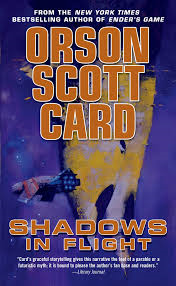
I just finished reading a more recent Ender’s Game book, from around 2011. This book is about Ender’s father Bean, who is sort of an omnipresent giant. He has three kid geniuses, one of which is Ender. Bean has to live in a cargo bay on the space-ship, and can hardly move due to being too huge and weak, yet he controls the ship through a hub. Bean’s kids have been travelling the speed of light, aging slower than the society they left (which has now forgotten them) in order to find a cure for their issue, which is basically being giants. A lot of snobby whiney six year old genius type arguments fill the early parts of the book, as the characters begin to have good development, through the scope of personal traits. Ender punches and breaks his brother Cincinatus’ (referred to simply as Sargent) nose, to end his dominance over himself and his siblings.
One interesting thing is how the sip has its own sustainable life food supply and garden, using the crew’s waste as fertilizer. The author also does a good job scientifically describing hydro-jet propulsion and a handful of other neat sci-fi concepts. If you saw that film the Martian, you will realize that the part where Matt Damon is growing a garden from his waste was heisted from earlier stories such as this one. Much of the book is written in Illuminati coding, otherwise known as metaphors. The Hive Queen which Ender and his siblings take on represents government and corporate control and programming. Ender alone maintains the belief that the worker class of aliens can survive and have meaning in their lives without the Hive Queen.
The major theme of this book is the enslavement of the individual to the state and whether or not the working class can survive without being directed by a strong dictator of sorts. The author, and the main character Ender, have faith in humanity, so he superimposes that on the alien species in regards to the Hive and its workers. I also assume that when card refers to the clones , he is thinking of them as part of the state’s enforcement apparatus, to be viewed as the strong arm necessary to keep the ranks in file.
Lets take a look at a passage from the book. On page 189 of the hardback, it reads, “Thinking of the workers made him realize that the workers who obeyed the Hive Queen as perfectly as they could, they were slaves. They were her daughters, but she refused to let them have minds of their own.”
Later, a few lines down it says, “they had their own wills, just like humans, but she had the power to force obedience.” I read this as meaning Card thinks we are mostly all debt consumerist debt slaves to the Federal Reserve and Federal Government (the clones), ultimately owned by a handful of wealthy families, including the Queen of England, whose portrait is on roughly half the world’s currency.
On page 231, a society where people are damned if they do and damned if they don’t is described. Work hard, and die from the strain of it. Don’t work, and die of deprivation. An economy so bad that there are no good choices, and everything becomes a Hamlet-like paradox. Card phrases it like this,” Creating the ultimate serfs,” said Cincinnatus. “And the perfect soldiers. They fight and die when she tells them to. If they balk, she’ll cut them off and they die anyway. It is a desperate kind of life for them.” Card hints to us that the only way we can win is to not play the game. To succeed from within the Matrix, one has to find a way to live by one’s own rules, and assert their own will to power, even if you have to bloody someone’s nose, or destroy a whole species to do it once in a while. Because that is the smart thing to do.